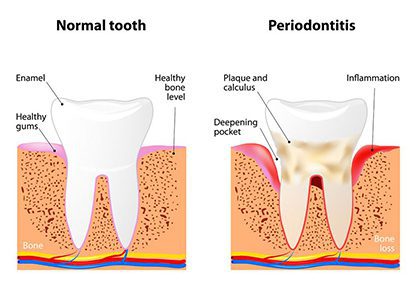When it comes to oral health, it is very important to bear in mind that the health of your teeth, gums and mouth can have a great impact on the health of other organs and systems in your body. Maintaining or restoring your oral health is therefore not just about the comfort and health of your mouth, but indeed the comfort and health of your entire body. Issues and diseases that begin in your mouth have the potential to cause harm elsewhere, and preventing them from occurring begins with understanding exactly what they are and how they start.
Periodontal disease, also known as gum disease, is a preventable condition that many adults yet suffer from. In fact, roughly seventy percent of all tooth loss as well as many health conditions like heart disease, stroke, diabetes and more, are caused by periodontal disease. It is therefore important to understand this disease, and what can be done to prevent or treat it.
Understanding Periodontal Disease
Periodontal disease begins with plaque build-up on the teeth. This sticky substance gets between the gum line and the tooth, and if not thoroughly removed through daily brushing and flossing it hardens into tartar. Tartar is very difficult to remove, and usually requires professional dental cleaning tools and techniques. In other words, when tartar forms on your teeth it’s highly likely that it will remain there for some time (or at least until your next professional dental cleaning).
When plaque and tartar remain in contact with the teeth for prolonged periods of time, the bacteria they contain begins to eat away at the fibers connecting the gums to the teeth. This creates increasingly deeper pockets that can become filled with bacteria. It is the measurement of these pockets around the teeth that allow dentists to diagnose periodontal disease, as any pocket that is deeper than three millimeters is cause for concern and requires aggressive treatment. A chief concern is that extensive periodontal disease can lead to bone loss that cannot be easily restored. It is true that depending upon the extent of the periodontal disease and individual’s overall health condition, a skilled periodontist may be successful in restoring at least some of the bone loss through bone grafting, however in many cases lost bone is lost permanently.
Treating Periodontal Disease
Periodontal disease is treated in a variety of ways, depending on the individual patient’s overall health and specific dental situation. First, a thorough evaluation is performed in order to determine exactly how extensive the periodontal disease is. This will allow for an accurate determination of exactly what type of treatment will work best to resolve the problem as quickly and effectively as possible. In cases where periodontal disease is not too far advanced, ultrasonic cleaning techniques, laser debridement and antimicrobial medicaments can be used with great success to remove the bacteria in the pockets. These treatments are normally performed over the course of several dental visits, and require great skill on a microscopic level in order to have the desired results. In some cases, arestin (an antibiotic powder) can also be placed into the diseased pocket in order to kill the infection directly and help begin the gum healing process. Following successful treatment for periodontal disease, a patient must continue to have the pockets cleaned and maintained on a regular basis in order to prevent bacteria from returning and therefore a periodontal disease relapse.
Prevention is Best
Needless to say, the most effective and comfortable way to handle periodontal disease is to prevent it from occurring in the first place. This is achieved through proper at-home care and regular dental examinations and cleanings. It is also very important to make sure any of your questions or concerns about periodontal disease are answered by a knowledgeable professional. Dr. Dovgan is always ready to spend time with his patients, helping them to understand the value of preventative dental care, and the best approach to preventing periodontal disease and other oral health issues.




